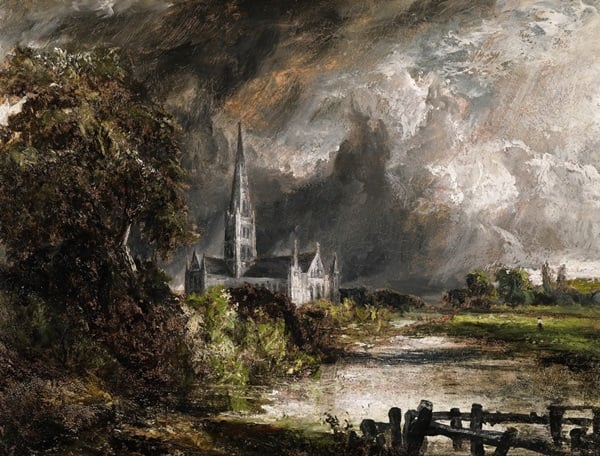
Salisbury Cathedral from the Meadows sold for $5.2 million today at Sotheby’s. It was confirmed as the work of John Constable thanks to the efforts of the buyer who purchased it for $5,300 in July 2013. Photo: Courtesy Sotheby’s.
Many in the crowd of dealers, collectors, and onlookers attending Sotheby’s main sale of Old Master paintings on Thursday January 29 remarked on the difference that a single day made when contrasting the sale with the dismal results at Christie’s Old Masters sale the day before (see: Canaletto, Caravaggio Fail to Sell at Christie’s Worst Old Masters Sale Since 2002).
The sale totaled $57 million, as compared with an overall presale estimate of $54–77.6 million. Of 104 lots offered, 73 (or 70 percent) found buyers. The stronger sold-by-value rate, 78 percent, reflected spirited bidding on a few key lots.
The fact that auctioneer Henry Wyndham opened bidding on so many lots at levels far below the printed low estimate, such as $80,000 on a lot with a low estimate of $150,000, suggested the house had scaled back expectations for numerous lots. In some cases this worked, with many lots being hammered down under or near low estimates. In other cases, the lower starting points failed to excite any enthusiasm.
Bidding wars, though rare, were in evidence for certain lots, generally at the high end including the highest lot, Willem Van De Velde the Elder’s 17th-century “pen painting” of a Dutch Harbor. Bidding on the detailed work, the style of which is described as “a fusion of painting and drawing,” opened at $1.1 million (the work was estimated to sell for $2–3 million). It was the target of competition between London Old Master dealer Johnny Van Haeften, seated in the room, and Sotheby’s head of Old Master paintings Georges Wachter bidding for his client via telephone. Van Haeften dropped out at $4.4 million and Wachter’s client won the work for $5.4 million including premium.
Also a top seller was Giovanni Paolo Panini’s The Pantheon, a view of the interior towards the Piazza Della Rotunda, which sold for $5.3 million (just surpassing its $5 million high estimate), breaking the artist’s record, after a protracted contest between two clients bidding via phone with Sotheby’s specialists. Wyndham opened bidding around $2 million and it was hammered down at $4.6 million.
The award for the most compelling market tale undoubtedly goes to the third highest-selling painting, a rediscovered John Constable landscape, Salisbury Cathedral from the Meadows (1831), that sold for $5.2 million, far exceeding its $3 million high estimate. The consignor had acquired the work at Christie’s London in July 2013, and paid a mere $5,300 for it, but then set about getting the work authenticated as a Constable. (See Sotheby’s Ratchets Up Price on Rediscovered Constable).
Aert van der Neer, Frozen River at Sunset (1677).
Photo: Courtesy of Sotheby’s
Another of the top sellers was Aert van der Neer’s Frozen River at Sunset (1660), which sold for $4.75 million, above its low estimate of $4 million. It was one of several works in the sale offered from the esteemed Old Master collector and investor J.E. (Jacqui) Safra, who had acquired the work for $3.9 million at a Christie’s London sale in 1997, after it soared far above its presale high estimate of $1.51 million.
Another Safra work was not as well received. The bucolic 18th-century London park scene by Canaletto (Giovanni Antonio Canal) titled London, a View of the Old Horse Guards and Banqueting Hall, Whitehall Seen from St. James Park (1749) was estimated to sell for $4–6 million. Bidding was opened around $2.8 million but at $3.3 million, it was hammered down as unsold or “passed” when it was clear no more bids were forthcoming. According to the catalogue, Safra also acquired this work at Christie’s London in July 1997. At that time, it was estimated to sell for between $1.7–2.4 million, and sold for $1.85 million.
Stay tuned for more coverage of Sotheby’s Old Master series including a group of Renaissance and Mannerist paintings curated by Fabrizio Moretti.